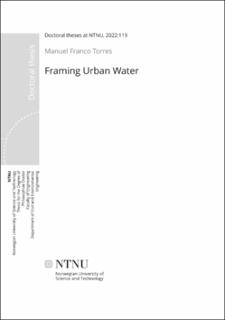| dc.description.abstract | In recent decades, Western societies have been experiencing accelerated growth in diversity, connectivity, complexity, and uncertainty. In the urban water sector, this evolution has thus far manifested in the emergence of new water-related needs and risks. Some good examples are those derived from climate change, resource scarcity, financial instability, infrastructure decay, cybersecurity and bioterrorism, emergence of new pollutants, and many others that connect water to energy, food, health, transportation, urban planning and liveability.
Since approximately the turn of the century, it has become increasingly accepted among scholars that the traditional infrastructures, management styles, and governance modes for urban water—or what conforms to the traditional configuration of urban water systems (UWSs)—are inadequate for the satisfactory and sustainable management of the emerging needs and risks. Despite the adoption of several technical and social innovations, system-wide transitions towards more sustainable UWSs have been sluggish and disappointing. While there is no doubt that technological advancements have made the provision of basic urban water services safer, todays UWSs are still, in general terms, astonishingly similar to those that were in place a century ago.
The UWSs of today must undergo a comprehensive transformation in order to adapt to an increasingly complex and uncertain reality. To understand this transition, and identify strategies to accelerate it, the present thesis considers the frames of reference of UWSs. These are the underlying aspirations, values, beliefs, assumptions, etc., within and beyond the urban water sector, which shape UWSs in terms of particular infrastructures, management and governance. The work explores different forms of these frames of reference such as paradigms, institutional logics and cultural frameworks.
In this thesis, it is claimed that all isolated and slowly-emerging innovations in infrastructure, management and governance reflect an emergent urban water paradigm that attempts to replace the dominant “old” paradigm underpinning traditional UWSs. Indeed, a growing number of scholars have argued that a complete and purposive paradigm shift is the most effective path towards sustainable UWSs. However, the paradigm shift has been also rather sluggish, preventing innovations in infrastructure, management and governance from becoming more widespread. Some factors that hinder this transition are explored in this thesis, although there are two, in particular, which must be highlighted. A prime factor may be the inertia of the old paradigm, which is embedded and entrenched in the elements that it shapes. These elements, which include physical infrastructures, management tools, rules, organization systems and language, are hard to change. This then results in a negative feedback loop; without a paradigm shift, there can hardly be innovations, and a lack of innovations will also prevent the occurrence of a paradigm shift. The second key factor that may hinder the adoption of a new paradigm is the fact that the new paradigm remains unacknowledged, vague and impractical, which limits the capacity of actors to transcend old ways of thinking and doing.
The goals of this thesis are:
• to understand what frames of reference/paradigms of UWSs are.
• to define the new urban water paradigm as a coherent system of philosophies which ascribe meaning to emerging changes in the governance, management and infrastructures of recent decades.to investigate how broad social transformations influence the transformation of the urban water paradigm.
• to advance the understanding of governance as a critical element of urban water services, and the knowledge of how it is shaped by different frames of reference.
• to suggest ideas which may accelerate the transition towards a new urban water paradigm and, hopefully, towards more sustainable urban water systems.
This work includes four peer reviewed academic papers and an extended introduction. The extended introduction provides a general outline to the topic through a conceptual framework, a description of research design, a summary of results, some highlighted general conclusions, and practical advice derived from the study. | en_US |
